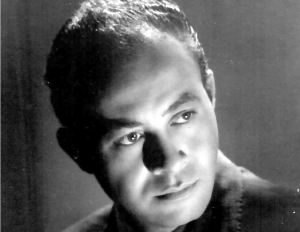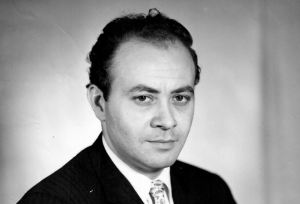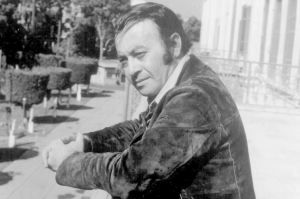Christoph Schlüren (nsnbc) : Born in New York City on 15 March 1928, the Italo-American composer and conductor Nicolas Flagello would have celebrated his 90th birthday on 15 March. Flagello was a man of pure genius, one of the finest and most riveting composers of the second half of the 20th century.
 Flagello grew up in a very musical environment. His brother Ezio became even more famous than Nicolas as one of the greatest bass-baritone singers in the history of the Metropolitan Opera. At a very young age already, Nicolas was presented as a ’wunderkind’ pianist and began to study composition with Vittorio Giannini (1903-66), another shamefully neglected Italo-American composer of remarkable stature (there are more: Walter Piston, Paul Creston, Vincent Persichetti, Peter Mennin, etc.).
Flagello grew up in a very musical environment. His brother Ezio became even more famous than Nicolas as one of the greatest bass-baritone singers in the history of the Metropolitan Opera. At a very young age already, Nicolas was presented as a ’wunderkind’ pianist and began to study composition with Vittorio Giannini (1903-66), another shamefully neglected Italo-American composer of remarkable stature (there are more: Walter Piston, Paul Creston, Vincent Persichetti, Peter Mennin, etc.).
Giannini had been praised as an eminent master by Richard Strauss in the 1930s and got prestigious commissions from Germany and Austria. His Requiem was premièred by the Vienna Symphony under Oswald Kabasta in Vienna in 1937 but never played again at all. Giannini wrote seven wonderful symphonies and some more phenomenal works and was held in high esteem not only by his numerous pupils but also by many of his colleagues who considered him as one of the most substantial and superior masters of the time.
Flagello became Giannini’s most prominent, masterful and original pupil (in the 1950s he also studied for some time in Rome with Ildebrando Pizzetti). Giannini and Flagello became life-long friends, and in the early 1960s we can also detect the influence of Flagello’s gloomy drama on Giannini.
Towards the late 1950s Flagello developed a musical style completely beyond the opposing trends of atonal modernism or neo-romantic conservatism. Giannini’s as well as Flagello’s music is always tonal, even in the moments where scholastic analysis cannot explain the chordal progressions anymore. It is tonal in that basic sense that everything in the piece is related to some centripetal notes in a way that correlates any given moment into a coherent whole that unfolds in a very dramatic way, often tragic, and always with intense lyricism.
 While this music always sings and always touches the listener in its irresistible immediacy it becomes more and more dissonant in the course of Flagello’s ripening. Everyone can feel the composer’s inner pain and struggle in a captivating manner that may remind us directly of Tchaikovsky.
While this music always sings and always touches the listener in its irresistible immediacy it becomes more and more dissonant in the course of Flagello’s ripening. Everyone can feel the composer’s inner pain and struggle in a captivating manner that may remind us directly of Tchaikovsky.
On the other hand, there is always an undeniable quality of structural logic and ’passionate sobriety’ in the background that never lets the music suck in sentimentality. You always feel the fragility of the inner world and the harshness of the outer world at once, thereby creating an immense tension from the beginning to the end, creating a fluctuating atmosphere of desperation and idealism in constant collision, and leading to sometimes almost unbearable clashes at the climactic outbursts.
Some listeners may think that this music sounds like great film music. This is true, to some degree, particularly concerning the emotional drama and the phenomenally colourful and often vehemently straight-forward orchestration. But when you listen deeper into the music you realize that its utmost formal stringency gives it a symphonic quality of the highest order that puts it in a row with the great symphonists from Mozart, Beethoven and Schubert via Bruckner, Brahms, Tchaikovsky, Dvorák, Sibelius, Debussy, Ravel and Bartók(who didn’t call their symphonic works ’symphonies’) to Prokofiev, Shostakovich etc.
Flagello’s music follows an unswerving path from beginning to end that is determined by the thematic oppositions, by the energy of the music’s inner forces. For a long time many opinionists accused of being a neo-romantic, behind his time, almost an anachronism. Today’s opinionists bow to the Beatles or Arvo Pärt. Today we can understand that Flagello’s creative spirit also filled the vacuum that was left between the ivory tower of isolated modernism and the needs of the ’normal’ listener. But he did so without the slightest concession to mediocrity, to trends, to non-artistic calculations of any kind. In his late years Flagello became deeply desperate in a music world that didn’t recognize his contribution at all, and his life ended in mental disorder.
Listening to the music I cannot withhold the feeling that he himself felt the approaching disaster as a constant threat. His music belongs to the most touching and riveting art in the 1960s and 1970s. There are several cds with Flagello himself conducting, and of course they give us some truly authentic impressions (he had studied conducting with Ionel Perlea).
 Listen to the incredibly dark and slow waltz ’Elles’ from his Lautrec Suite of 1966! Or to the phenomenally freely shaped and almost improvisatory Capriccio for cello and orchestra from 1961! He wrote a great Symphony for large orchestra that belongs to the best works of the genre, and a Second Symphony for wind orchestra that is no less enlightening in its unity of conflicting psychological strains.
Listen to the incredibly dark and slow waltz ’Elles’ from his Lautrec Suite of 1966! Or to the phenomenally freely shaped and almost improvisatory Capriccio for cello and orchestra from 1961! He wrote a great Symphony for large orchestra that belongs to the best works of the genre, and a Second Symphony for wind orchestra that is no less enlightening in its unity of conflicting psychological strains.
There is fantastic music for choir as well as for solo singers: the children’s opera ’The Piper of Hamelin’, the ’Passion of Martin Luther King’ (1968) that clearly demonstrates Flagello’s courage and total absence of opportunism, and many more works (some of his most ambitious compositions have not been recorded to date).
There is grandiose chamber music such as the Sonata for Violin and Piano or the Piano Sonata, and his music always exposes suffering amidst zest for life. In some pieces for piano and percussionists Flagello seems to come much closer to the sounds of the avantgarde (’Electra’, ’Divertimento’). But he never followed the latest trends.
As a starter I recommend the wonderful YouTube video of his magnificent ’Burlesca’ for flute and guitar: https://www.youtube.com/watch?v=aPdRSvf41sQ Here you can experience music that has freed itself from any limitations by stylistic trademarks – is this classical music, is it modern? It constantly transcends such narrow-minded boundaries simply as a result of its free, innermost musical nature.
If you love the passionate drama of Tchaikovsky and the sinister tensions of Shostakovich, and if you don’t refuse Italian Belcanto, then go for Flagello. You won’t regret it.
Christoph Schlüren – nsnbc 06.04.2018 – Christoph Schlüren, from Munich in Germany, works as conductor (Deutsche Kammerakademie Neuss, Symphonia Momentum, St Michel Strings Mikkeli) and musical mentor for chamber groups and soloists as well. Christoph Schlüren has more than 20 years experience as journalist, music author, music editor and program adviser. Artistic director of Aldilà Records. Particular interest in never-ending discovery of substantial unknown music in any kind of style and genre. Studied with Sergiu Celibidache from 1981 to 1996. A basic book on musical phenomenology will be released soon.
Source Article from https://nsnbc.me/2018/04/06/passionate-drama-and-sinister-tensions-some-reflections-on-nicolas-flagello-around-his-90th-birthday/
Related posts:
Views: 0
 RSS Feed
RSS Feed

















 April 6th, 2018
April 6th, 2018  Awake Goy
Awake Goy 










 Posted in
Posted in  Tags:
Tags: 
















